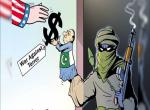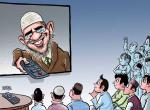Osama bin Laden’s killing may have closed one chapter, but the list of Af-Pak issues is long. The US has to depend on Pakistan, but question its reliability.
However emotionally satisfying for many the slaughter of Osama bin Laden, it should be deeply disturbing for many more on a crucial point. The Al Qaida leader had eluded a massive manhunt for him all these years, hiding supposedly in some inaccessible Af-Pak borderland areas, untraceable by US human and signals intelligence. The Pakistani political and military leadership has all along denied any knowledge of his whereabouts, even feigning that he was not in Pakistan. And where did the archetypal terrorist finally meet his nemesis- in a villa of sorts in Abbottabad, in a town peopled with retired Pakistani military officers. It is less important that Osama bin Laden has been killed; much more pertinent is where he was killed, as this speaks volumes of the deception of the much-touted non-Nato ally of the Americans.
Of late decibel levels of American complaints against Pakistan’s selective combat against terrorism have risen, and direct accusations against double-dealing by the ISI have surfaced. The dark shadows of Pakistan’s performance on terrorism become easier to apprehend with the exposure of this conspiracy of the country’s deep state to protect Osama bin Laden and, surely, his acolytes like Ayman al- Zawahiri, with all the past charade of video-tapes secreted to Al Jazeera.
Pakistan’s red-handed complicity has been exposed dramatically, but it is not in US interest to play it up. They need Pakistan as much as before to extract themselves from the Afghan quagmire with honour and prestige in tact, and more importantly, without Obama’s bid for a second term being jeopardized by any scar of failure in the Hindukush. The symbol of terrorism has gone, but its substance remains. Osama bin Laden, hounded and hiding, had become a spent force as a field leader, but he has remained a potent inspiration for those who still dream of destroying the Great Satan.
The Al Qaida, never a structured, hierarchical organization, operates as a dispersed and decentralized collection of groups driven by shared hatreds and violent solutions sanctified by a self-serving interpretation of Koranic texts. It is a mind-set fired by a vision of society fundamentally opposed to that of the West. Bin Laden’s elimination is not enough to change the course of the combat; the West has to restrain its impulse to dominate, control its tendency to use military force to resolve political problems and discard double standards.
President Obama was right to recall in his address that America’s fight is not with the Islamic world. The amount of firepower that US and NATO are expending in Libya should be matched with equal diplomatic energy to resolve the Palestinian issue.
The situation on the ground in Afghanistan has little to do with bin Laden’s objectives. The Afghan Taliban treated Osama as a guest; he needed them more than they needed him. Their come-back in Afghanistan has nothing to do with bin Laden; it has all to do with Pakistan’s strategic ambitions, its protection of its Afghan Taliban assets, and the ambivalence of the West towards the Taliban, best exemplified today by a willingness to “reconcile” with them as part of a political solution in Afghanistan. If it took the Americans years to trace Osama’s hide-out, the watering hole of Mullah Omar and his ilk in Quetta has been known to them for a long time. They have chosen neither to put Pakistan on the mat for its perfidy in Afghanistan, nor decimate the Afghan Taliban leadership which is Pakistan’s partner in the pursuit of its Afghan policy. Having allowed the ground situation to deteriorate in their disfavour by ignoring the Taliban threat and targeting principally the Al Qaida, they now have concluded that the only way to retrieve the situation is to both depend on Pakistan even as they question its reliability, and engage the Taliban even as they fight it. it is this half-cocked approach that feeds the growing perception that the Americans have possibly lost their moorings in Afghanistan.
As days pass it will be clearer whether it was essentially a US operation or the Pakistanis were involved, and at what stage. It says much about of the Pakistan-US relationship, with all its undercurrents of cooperation and suspicion, the prickly assertion of sovereignty by Pakistan at one level and a humiliating cession of it to a foreign force at another, that the bin Laden operation was carried out not by the Pakistani security forces by US Special Forces presumably flying in from Afghanistan. It is not clear under what provisions of Pakistani law foreign military units were allowed to engage in a law and order operation deep inside Pakistani territory and kill a person found there. The US forces carried away Osama’s body with them; it was not subject to identification and autopsy in Pakistan as per its laws. This exposes the real quality of the Pakistani state and the temper of its constituents.
Did the fuss created over the Raymond Davis affair by both sides have some links to the bin Laden operation? Now that this has been accomplished it’s likely that, irrespective of the odious nature of that personage, anti-American feelings in Pakistan will be further fuelled. The extremists in Pakistan would have one more reason to accuse the country’s leadership of joining hands with the Americans to eliminate, this time, a uniquely powerful contemporary symbol of Muslim resistance to US imperialism. The Americans have the obligation to recognize Pakistan’s cooperation in this operation as otherwise Pakistani sovereignty would have been blatantly violated. Too much credit given to the Pakistan government could, of course, provoke a stronger extremist backlash. President Obama has been rightly restrained in crediting Pakistani cooperation, limiting himself to only mentioning Zardari’s name and hoping Pakistani cooperation will continue.
Obama can savour this hour of emotional catharsis, but the reprieve he has got from his worries is temporary. Osama’s death closes a chapter but the book of America’s Af-Pak problems is long.
-----------------------------------------------------------------
Published in Hindustan Times Dated: 2nd May, 2011









Post new comment